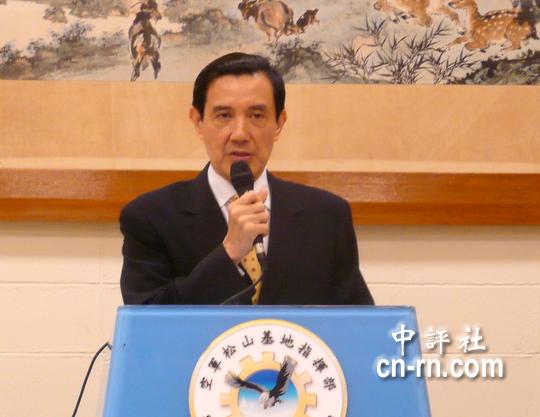
|
| 馬英九強調,兩岸政治對談沒有時間表,兩岸必需先經後政、先易後難。(中評社 倪鴻祥攝) |
中評社台北10月20日電(記者 倪鴻祥)美聯社昨天刊出專訪馬英九的內容,馬英九認為與他受訪時所談的原意不同,昨晚親自說明。馬英九強調,他始終秉持“先經濟後政治”的一貫原則;兩岸目前仍在商討許多經濟議題,因此不會討論政治議題,也沒有時間表;訪問過程更沒將政治對談等議題與任期連結。
府方昨晚透過“行政院新聞局”向美聯社要求更正,以下為府方整理馬英九受訪過程的原文,以及美聯社報導內容,所對外發布的新聞稿。
府方稱,馬英九19日接受美聯社專訪,美聯社最後刊出的報導內容與馬接受採訪時的談話原意不同,本府已透過新聞局向美聯社要求更正:
首先,在有關統一的問題上,美聯社在報導表示:
Any political union, he said, would require Beijing to adopt democracy and respect for human rights, under special scrutiny following the award of the Nobel Peace Prize to jailed China democracy campaigner Liu Xiaobo. Because of such concerns, Ma did not cite any timetable for the process, saying it would be a "long historical" transition.
馬英九指出,兩岸政治統一須以中國大陸採取民主制度且尊重人權為前提…。
惟實際的訪談的錄音逐字內容如下:
AP: I wanted to circle back to something you said earlier. I think what I heard you say was that a truly democratic system of government in the mainland is the only way that the Taiwanese people will engage in a conversation about unification.
President Ma: I think that will help, that will help. In other words, but there’s no guarantee how long it would take for the people of Taiwan to believe it’s time to do so. And opinion polls show that the majority of the people support maintaining the status quo. And obviously this trend has been maintained for over at least 20 years. And given the high approval rate of the status quo I think we’ll continue. So far, the mainland, aside from the economic side, the political reforms on the democratic side have made little progress.
美聯社:我想要回到前面您提到的部分。我想我剛才聽到閣下表示,一個真正的民主體制政府在中國大陸出現,是台灣民眾唯一會考量與中國大陸就統一進行對話的途徑。
馬英九:我想那會有幫助,會有幫助。換言之,台灣民眾需要多長時間才會認為是時候來做這件事,這並沒有辦法保證。民調顯示,大部分的民眾是支持維持現狀。而顯然這樣的趨勢已經維持了至少超過20年之久。從目前高比例支持維持現狀的情況來看,我想還會持續下去。到目前為止,撇開經濟面向,中國大陸在政治上朝向民主的改革仍然鮮有進展。
|